DC Pride Poem-a-Day is proud to present 30 new short videos, in celebration of National Pride Month. Each video features a different poet from the greater Washington, DC region, reading a poem on the theme of heritage. Videos highlight the talent and rich diversity of poets from the nation’s capital who identify as LGBTQ+. Check back each day in June 2023 for a new poem!
“Ghazal for Lost Women” by Danielle Badra
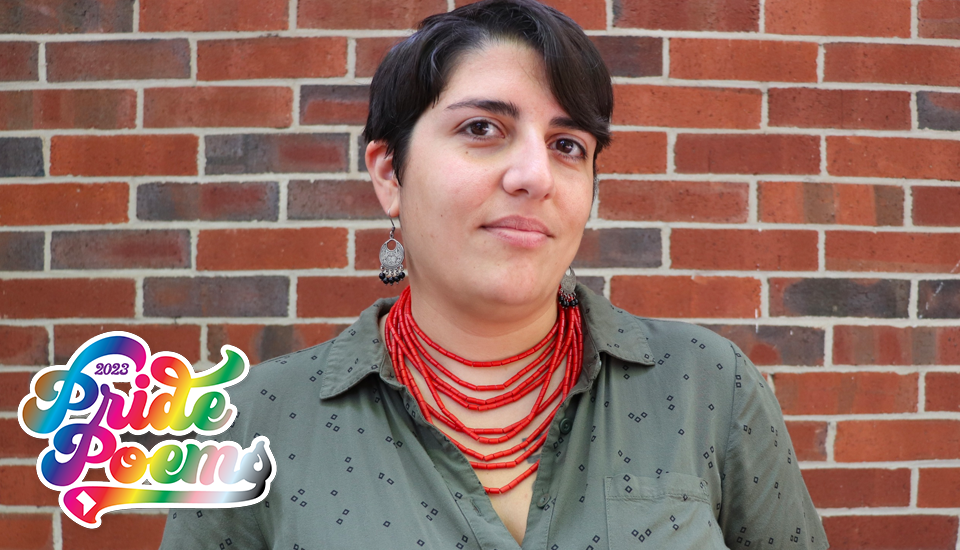
View Poem TextView Poet Biography
Ghazal for Lost Women
Under the harvest moon there is always a camel & the camel is always a far lost woman,
lost to the world she once inhabited of red wine and unleavened wafers. Womanwafting scent of orange blossom seeping from attar syrup cooled on the kitchen counter,
counter to the culture of her mother who baked with anise seeds instead of walnuts. Shewalled herself inside her fearful heritage when the once world’s center certainly collapsed,
collapsing her English into Arabic attempts for fresh watermelon, bateekh woman.Bateekh, her favorite word to pronounce when she was unfamiliar with phlegmy letters.
Let her return to the camel & the camel return to her a sense of discomfort like the day shehid beneath pines playing with the boy next door a game that made her feel monstrous.
The monsters under her mattress were really inside her all along, terrorist woman,terrorized by the thought of an evil side to her bloodline, of suicide bombers and martyrs,
martyrdom was never all that appealing in comparison to mediocrity, the average woman.Rage is relative to bloody knuckles and what it was they were fighting for. For her huriya,
freedom is relative to the laws that bind, she was bound only to her body, scarred woman.Scarab beetles stood for reincarnation in Ancient Egypt, said to push across the sky the sun.
Deadly woman, deep is your longing for the land of memories, dwelling place of desires, al-shams.Danielle Badra (she/they) is a queer Arab-American poet from Michigan who currently resides in Virginia. She is the 2022-2024 Fairfax Poet Laureate. Her book, Like We Still Speak, was selected by Fady Joudah and Hayan Charara as the winner of the 2021 Etel Adnan Poetry Prize and published through the University of Arkansas Press in 2021.
Previously appeared in Like We Still Speak, University of Arkansas Press (2021). Reprinted with permission of University of Arkansas Press.“Gabriel” by Malik Thompson
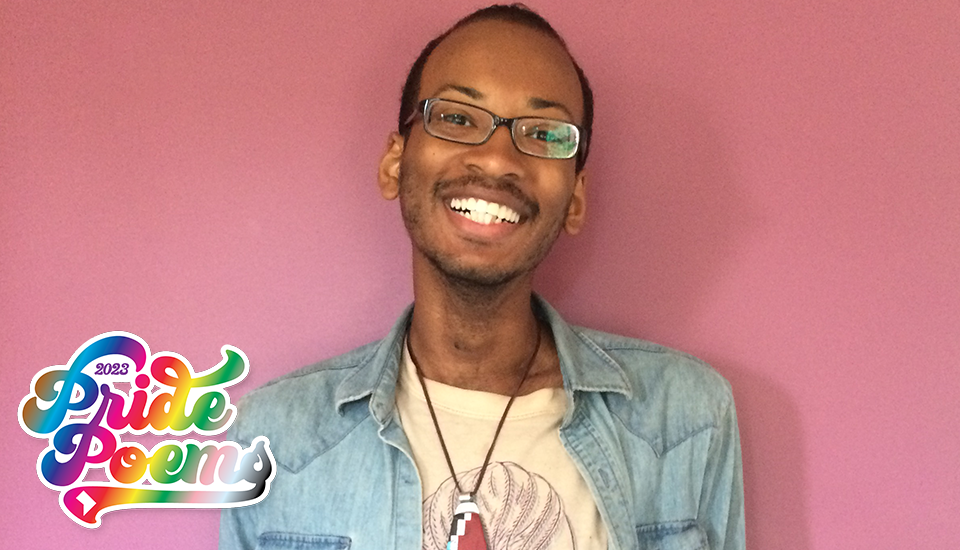
View Poem TextView Poet Biography
Gabriel
after Adrienne Rich
O monstrous divinity,
O grisled seraph withskull of man &
star-bleached wing,your beautiful face
veiled in dark fire,the coil & shudder
of those insatiate flames—unspeaking beast
fallen from the moon’sumbral half. Everyone’s eidolon
cloaked in the mythosof scripture.
Archangel,you visit me nightly—
in my bedroom, loomingfor another hushed
evening. Tender soulor impending tempest?
You breathe windinto your celestial horn,
unleashing a god-fleckedsquall—cracked asphalt
washed offin hallowed rain.
His messagedrenches his body,
so I pullfurther back—
Malik Thompson is a Black queer man from Washington, DC. His worked is featured or forthcoming in Poet Lore, Voicemail Poems, and MQR Mixtape, among other publications. Thompson is a Tin House alum, and has received support from Lambda Literary, The DC Commission on the Arts and Humanities, Brooklyn Poets, and Obsidian Foundation.
- Find Malik online:
- i
Malik Thompson is a resident of Mt Pleasant.
“Jewish Tourist in Toledo, Spain” by Jessica Genia Simon
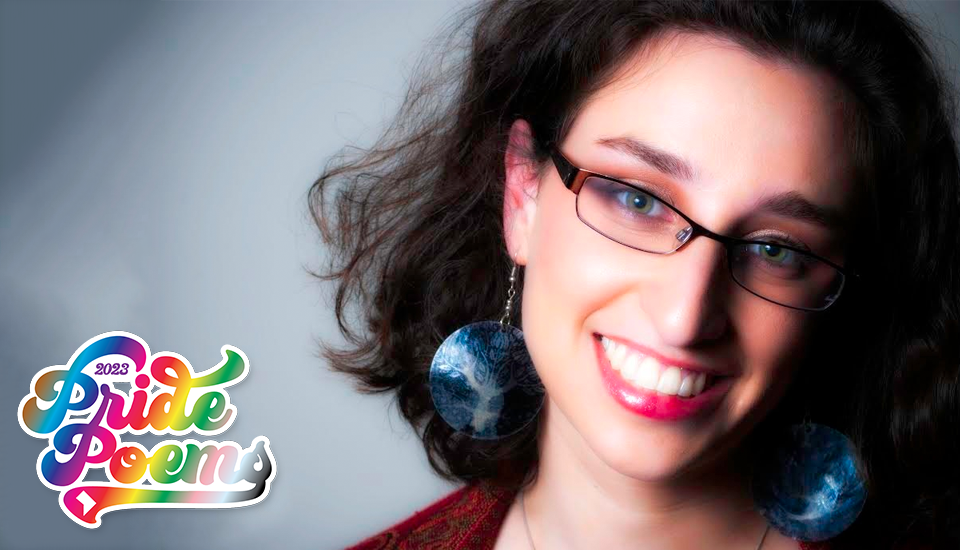
View Poem TextView Poet Biography
Jewish Tourist in Toledo, Spain
Stones are more reliable than men.
On the walls of this Catholic church,
once a synagogue, then a mosque
a Cross adorns the throne, but a Star of David
hides in a ceiling tile; a Converso.
Arabic appears through whitewash; a Morisco.In a souvenir shop, a man shows me
a statue of The Virgin Mary
that used to hide a mezuzah
on a door jamb, points to his forearm,
“Jewish blood.”He tells me his grandfather kept
the key to the Toledo home
abandoned after the Inquisition.
A Palestinian man holds onto a key
to his grandfather’s house
in Jerusalem, a house that may
or may not, still stand.There exists a certain amnesia
in countries and pious men.
One God paints over another,
switches the symbol above the door.
Men chisel granite,
build cities atop cities,
say there is nothing beneath,but stone remains. No matter
how deep truth is buried,
time turns rock
to fossilized braille.
Men hold onto keys
and history flows down
tributaries of memory
to etched stones.
I turn to leave Toledo, cross back
over the bridge as the city ebbs away
through the window of the train.Jessica Genia Simon began writing poetry at age seven. Her poems have been published in many journals including the Atlanta Review and Super Stoked: An Anthology of Queer Poetry from the Capturing Fire Slam & Summit. She works at a gun violence prevention nonprofit in D.C. and lives with her wife, daughter, and orange tabby cat in Silver Spring, Maryland. Her first poetry collection is Built of All I Shape and Name, Kelsay Books, 2023.
Previously published in Built of All I Shape and Name, Kelsay Books, 2023. Reprinted with permission of the author.“Why I Can’t Say the Word Lesbian Without Thinking of My Therapist” by Emily Holland
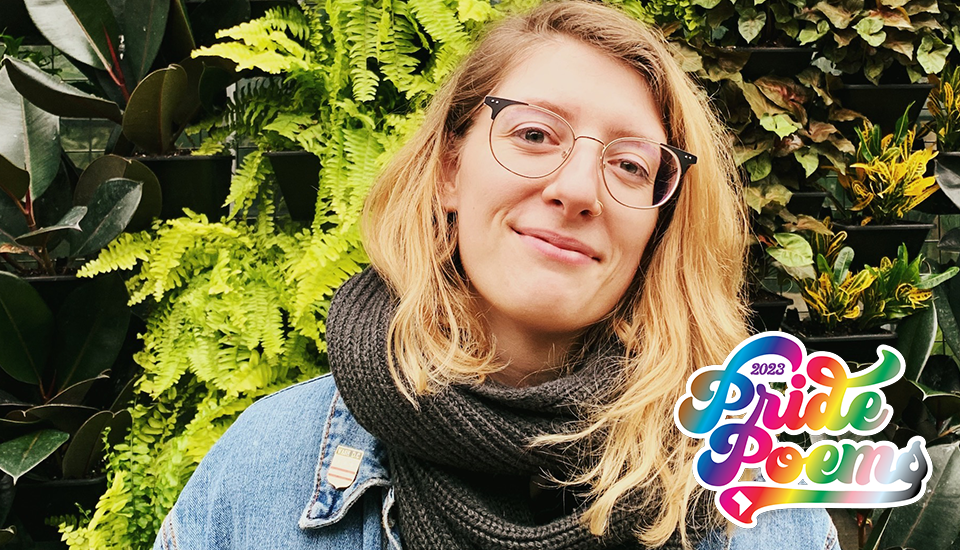
View Poem TextView Poet Biography
Why I Can’t Say the Word Lesbian Without Thinking of My Therapist
At Sarah’s thirteenth birthday party, someone
said Your mom is—what
—sinneris abomination is
the thingGod warned us about.There must be something, they said,
in the bloodinsoluble—how it turns red when touchedby oxygen,
we, too, turnfrom Godwhen touched
by someone like her.
. . .
Prom night, after dancing,someone said
Your sister is—what—acting different
cut her beautiful brown hair
down to the root,pruned it back
so farit might not grow again,acting lessfeminine, more
in control.
. . .
My first year at college
someone said You are—what—lesbo
descendant of dyke,
divergence in a long lineage.
Tainted bloodline.Desire never matters here.
These are the possibilities passed down to us: to be
or to becomeor to have always been.
These are what we call signs only
in hindsight:smell of bubblegum chapsticksharing a sleeping bag
tucking her hair behind an earwanting to hold her hand
or touch her cheekthe way best friends never do.Emily Holland (they/she) is a genderqueer lesbian writer. Their poems appear or are forthcoming in publications including HAD, Shenandoah, DIALOGIST, Little Patuxent Review, lstw, and Black Warrior Review. They are the author of the chapbook Lineage (dancing girl press) and the recipient of multiple fellowships from the DC Commission on the Arts and Humanities. She is currently the editor of Poet Lore, an adjunct professor at GWU, and the chair of OutWrite, DC’s LGBTQIA+ literary festival.
Previously appeared in Wussy. Reprinted with permission of the author.“What Persephone Taught Me” by Casey Catherine Moore
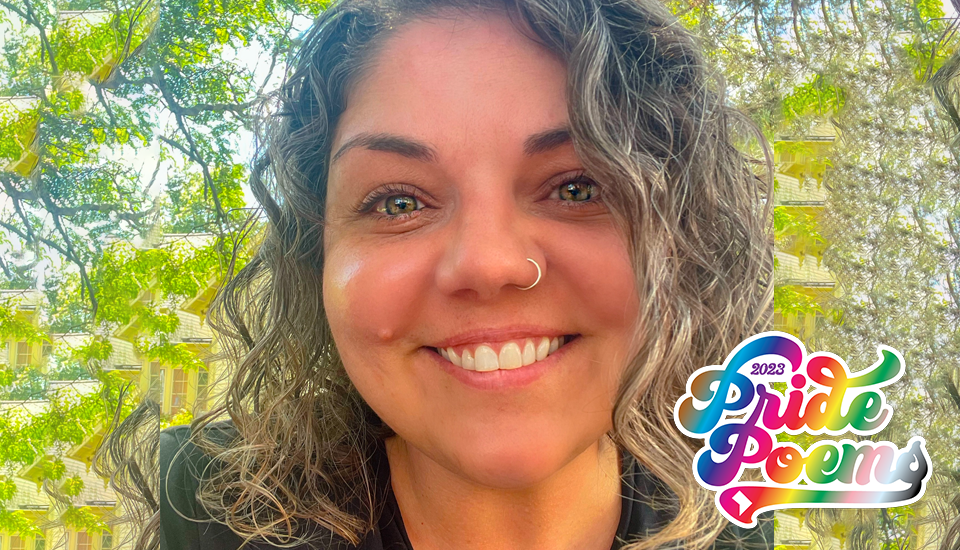
View Poem TextView Poet Biography
What Persephone Taught Me
I can survive amid summer wildfires.
When I can’t see, but still perceive,
with singed hair and crimson eyes,
mind and body constantly reeling,
and a pulse I can never stop feeling.I can survive under winter darkness.
When my leaves are gone,
the ice rain is heavy,
I am unsteady,
and my branches freeze
and fall to the Earth
with a thunder crack.I’ve survived
fires and floods,
hurricanes and tornadoes,
summer volcanoes,
and days and weeks without rain
when the shakes begin to addle my brain;
and long winter nights
when the ice enters my bones
and flash-freezes me within my mind alone.I am
I am still
I am still here.I survive by soaking up the summer sun
to radiate later from my skin
and by saving winter ice under my tongue
to cool my core on the Dog Days
when everything rages within.My roots always burrow deeper into Earth,
sending sweet fruits of Ceres
up through my feet, into my trunk, and out
to my fingertip branches and wearied leaves.I am
I am still
I am still here.Surviving the seasons made me know
the strength of the root.Casey Catherine Moore is a bipolar, bisexual writer, educator, and activist. She holds a Ph.D. in Comparative Literature from the University of South Carolina with a focus on Classics, Latin poetry, and women’s and gender studies. Moore’s work can be found in academic and creative publications including the Comparatist, Sinister Wisdom, Samfiftyfour, Oyster River Pages, and Bourgeon. She is the co-producer and co-host of Homo Stanzas, a queer spoken word showcase, and she has been a featured poet for Busboys & Poets, The Nail Salon, Capturing Fire, and the 2022 March for Medicare for All Rally in Washington, DC.
Casey Catherine Moore is a resident of Cathedral Heights.
“Self” by Jona Colson
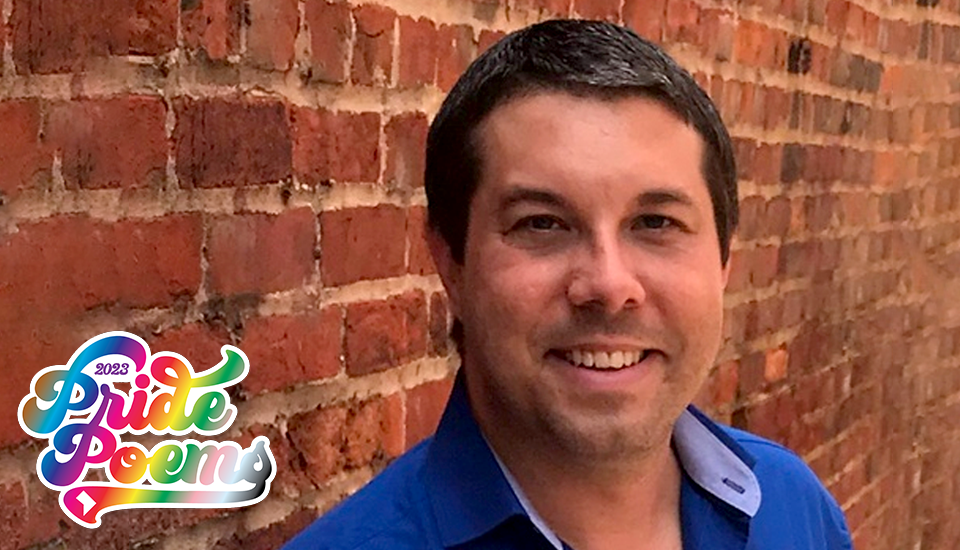
View Poem TextView Poet Biography
Self
What am I made of? Eggs over easy
and white toast. A mid April notionof love under spring’s harsh blossom,
or a basket of red coxcombs and daisiesbeside my father’s casket.
It’s hard to think beyond the houseon the hill—the garden filled with
corn and radishes. When I was fiveI slept by a watermelon in the full moon
and woke up to walk in the grasslandsthat are now covered in new homes and fences.
Perhaps I am merely anxious puffs of breath at 3 a.m.since my mother said I am cursed and belong
elsewhere only to be missed someday.Jona Colson’s poetry collection, Said Through Glass, won the 2018 Jean Feldman Poetry Prize from the Washington Writers’ Publishing House. He is the co-editor of This Is What America Looks Like: Poetry and Fiction from D.C., Maryland, and Virginia (2021). His poems have appeared in Ploughshares, The Southern Review, The Massachusetts Review and elsewhere. His translations and interviews can be found in Prairie Schooner, Tupelo Quarterly, and The Writer’s Chronicle. He has received fellowships from the Virginia Center for the Creative Arts and the DC Commission on the Arts and Humanities. He is a professor of ESL at Montgomery College in Maryland and lives in Washington, DC. In 2022, he became co-president with Caroline Bock of the Washington Writer’s Publishing House and edits the bi-weekly journal, WWPH Writes.
Jona Colson is a resident of Dupont Circle.
Previously appeared in Said Through Glass (Washington Writers' Publishing House). Reprinted with permission of the author.“The Act of Breathing” by H.L. Sudler
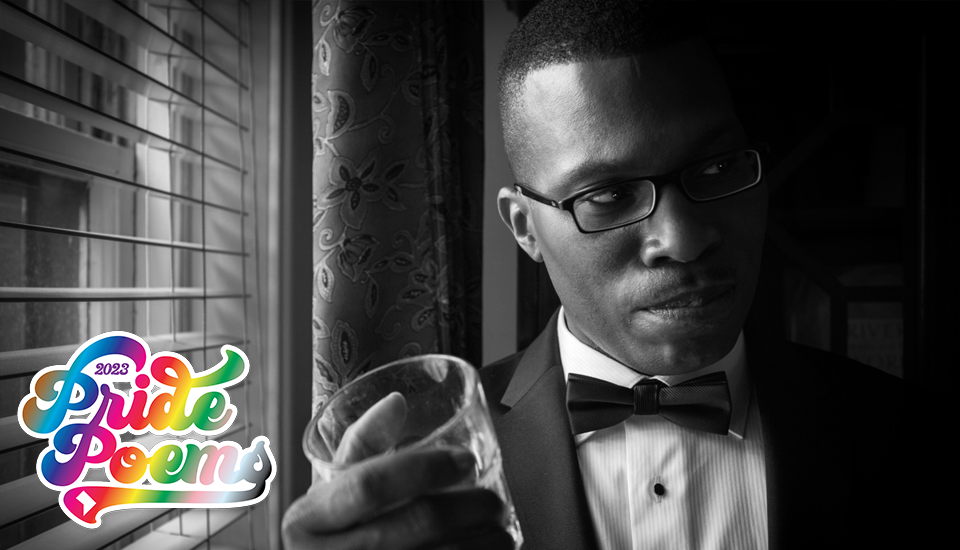
View Poem TextView Poet Biography
The Act of Breathing
When first we wake
We consciously experience the act of breathing.
That first deep inhale
Through the mouth, through the nostrils.
We open our eyes
And our eyes are opened.
When we inhale,
We breathe in everything that has come before.
Last night, yesterday, the day before, last week, last month, last year,
Decades and centuries ago.
Our youth, our childhood.
When we inhale,
We breathe in everything that has come before.
Fill our lungs with it, and also our memory.
Words of our mother and father, words of our grandparents.
Words of lovers and teachers and friends.
Words of enemies and rivals and sages and mentors.
Don’t touch that fire!
Look before you leap!
Obey your mother and father.
The price of love is steep.
Stand up straighter!
Stand your ground!
Love your neighbor.
All things come around.
When we inhale,
We breathe in everything that has come before.
Smells, tastes, feelings, sounds.
Also: past lives and history.
Also: the sins of our fathers, our founding fathers.
Liberty! Rights! Evolution! Framework!
But also: enslavement, suppression, division, appropriation.
When we inhale,
We breathe in everything that has come before.
But for the African American breathing is precious;
For any breath could be our last.
And so we breathe in.
To remember, to recall, to honor.
To summon the strength, patience, and determination that imbued the spirits of our ancestors
Who likely paid a greater price for their lives than we could ever imagine.
And we breathe out.
To release our pain, to clear our minds, to push forward, to calm down.
The act of breathing is a skill.
For some more than others.
The catch is to not hold your breath!
Living neither here nor there, trapped in time!
But to put both feet on the floor.
To exhale.
And with one big push
Stand tall and move on with your day.
With one big push
Stand tall and move toward your waiting bright future.
This is the act of breathing.H.L. Sudler is the author of six books, including Patriarch: My Extraordinary Journey from Man to Gentleman, CafeLiving’s Favorite Cocktails (with Keith Vient), Man to Gentleman: A Beginner’s Guide to Manhood, his short story collection The Looking Glass: Tales of Light and Dark, and his thriller novel series Summerville and Return to Summerville. His short story The Way of All Flesh was selected for the PATHS Humanitarian Writing Award. He has served as a magazine publisher, a newspaper editor, and a contributing writer to numerous anthologies and periodicals. He was born in Philadelphia, Pennsylvania, and currently lives in Washington, DC.
“Š” by Natasha Sajé
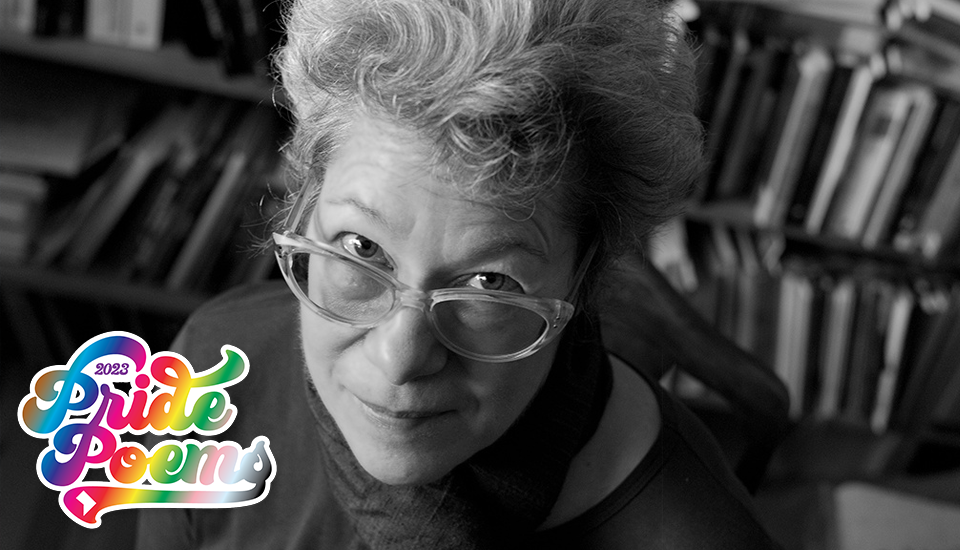
View Poem TextView Poet Biography
Š
Slovenia
at the room of a sleeping child, a finger to the threshold
teeth drawn together
hissing softened by lips
echoed in the cavelittle roof (strešica)
difference between a chocolatier (Kraš) and lime-
stone (kras), white rocks
struck by moonas in sugar
which can be made from beets, cane, corn, maple, fruit, and milkits sweetness rhymes with bees
we say one thing is not another thing
and in this language every letter is pronouncedcup gathering a drop of sound
dusty taste of the water
filmed skin after walking in the river
sound the residue of letters
I’d like a letter that splinters
language from its parents to build
a house of sticks overlooking the sea, letting waves
instruct me—air
rushing through my teeth is also air
that could have passed through the tailpipe of a busI want happiness without a hole in it, the heroine says,
and the reader knows she’s doomed to a life of riftssome ideas are so deep you can live in them, deeper than the highest
mountains are high, subterranean stalactites forming
gypsum flowers like wallpaperin such darkness the pale pink
olm, his degenerated eyes covered
by skin, can live to a hundred years of agewan cousin of the newt or salamander
finding his way via smelleven Proteus, shepherd of the sea’s flocks, cannot
protect him from polluted groundwater
and his own rarityhe lives only in one place on earth
a place where š is utteredand might, if things were different, be
a dragon in the ocean’s wavingfricative, or at least a snake with a crown
none poisonous in this quiet country
Natasha Sajé was born stateless in Germany and grew up in NYC and suburbs. She lived in either DC or Baltimore 1978-1998, at which point, equipped with a Ph.D. from the University of Maryland, she took a teaching job at Westminster College in Salt Lake City. Now retired from that job/exile, she lives in DC with her Veterans Administration employee (and Boston sports fan) wife. Natasha teaches poetry and non-fiction writing at the Vermont College of Fine Arts and is the author of five books of poems; a memoir-in-essays (Terroir: Love, Out of Place); and a postmodern poetry handbook.
Natasha Sajé is a resident of Cleveland Park.
Previously appeared in Vivarium (Tupelo Press, 2014). Reprinted with permission of the author.“Federal Hill Fourth of July” by Heidi Mordhorst
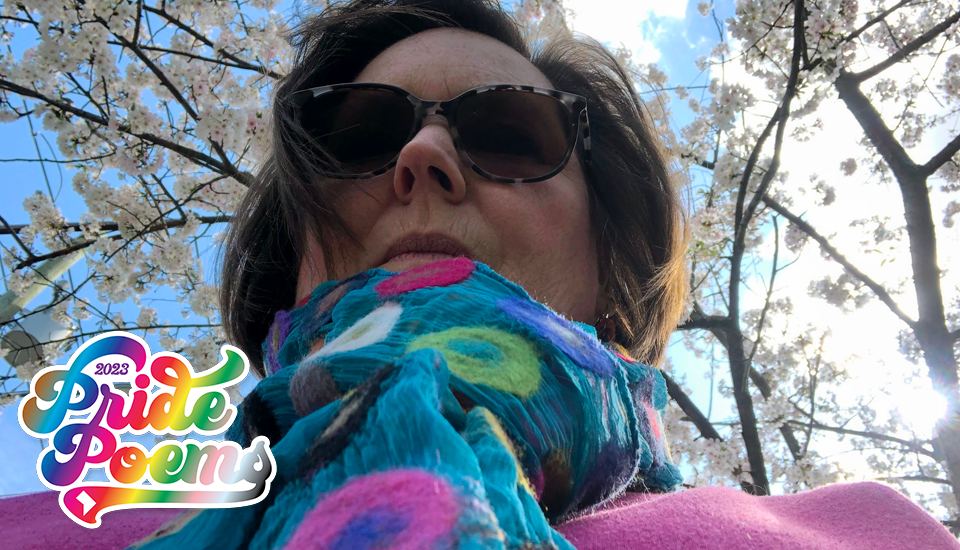
View Poem TextView Poet Biography
Federal Hill Fourth of July
We leaned into the hill as the night exploded toward us.
The grass grew high and green and thick.
Into the thick the high the hill exploded as grass
Night leaned toward green and we and us grewThunder worked a fire in the star-shattered air.
The noise engulfed the breathing throng.
Breathing athunder the star-throng engulfed
The noise shattered the fire worked in airOnly you and I, fingers touching, stand alight.
A current holds us to the ground.
Fingers alight you the only ground I stand
A current touching to hold us andHeidi Mordhorst is the author of two collections of poetry for young readers as well as contributions to journals and anthologies for adults and children. She taught in public school classrooms for 35 years and recently served on the NCTE Excellence in Poetry Award Committee. Mordhorst now offers multiarts poetry programming for young writers at school sites around the DMV and at her home studio in Silver Spring.
“Taxi Driver Brother Man” by Sunu P. Chandy
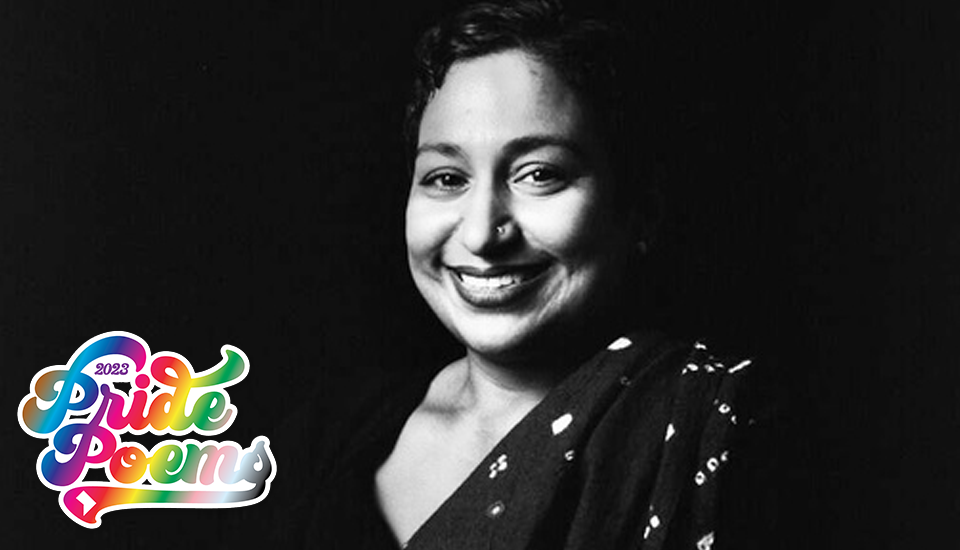
View Poem TextView Poet Biography
Taxi Driver Brother Man
Winter fling and I trying to get home
Sunday night from the dyke bar.
But taxi cabs are not stopping
for Black girls who look like Black boys,
or for Indian girl in baggy pants
hanging out with Black bois,
not looking like attorney in suit
with white friends and briefcase.Winter fling and I finally get a cab
and have the nerve to start kissing.
After all that is why she got on the plane
and came to this city –
no cousins that she needs to visit really.
We start kissing and Taxi Driver Brother Man
says, I don’t take that in my cab. We stop immediately,
and we stop completely. But his disgust
too potent perhaps, Taxi Driver
Brother Man pulls over—Just get out.
Angry and afraid, the cold unbearable,
we wait and wait, once again.Next day I see a brochure about how city cabs can’t discriminate
on the basis of sexual orientation, or race.
Would Taxi Driver Brother Man have kicked out
a straight, white, kissing couple?
Don’t think so. Don’t think so.Do I call the enemy, the TLC, the Taxi
and Limousine Commission
on Taxi Driver Brother Man?
The same place that takes away their licenses,
for bullshit reasons?
Don’t think so. Don’t think so.And would I feel the same way if my dad
was the taxi driver and the two girls kissing
were some punk Lower Eastside white girls?
Don’t think so. Don’t think so.
I might be saying, Why they gotta disrespect
an older South Asian man with this mess?
What’s wrong with them?I don’t want to be kicked out Taxi Driver Brother Man,
and I don’t want to turn you in either.A few days later I am speaking on a panel
with Taxi Advocate Professor Man. I pretend I am down
for their cause, completely. But what I really want to know
is, when is Taxi Driver Brother Man, gonna be down for me?Sunu P. Chandy (she/her) is a social justice activist through her work as a poet and a civil rights attorney. She’s a queer woman of color and lives in Washington, D.C. with her family. Chandy is the daughter of immigrants from Kerala, India. Her collection of poems, My Dear Comrades, won the 2021 Terry J. Cox Prize, and was published by Regal House in March 2023. Chandy is delighted to highlight the book’s incredible cover artist, Ragni Agarwal. Chandy is also the legal director at the National Women’s Law Center, and on the board of the Transgender Law Center. Chandy was honored as one the 2021 Queer Women of Washington.
Previously appeared in My Dear Comrades, Regal House Publishing, 2023. Reprinted with permission of the author.“The Silence of Ice” by Ron Leo Vogel
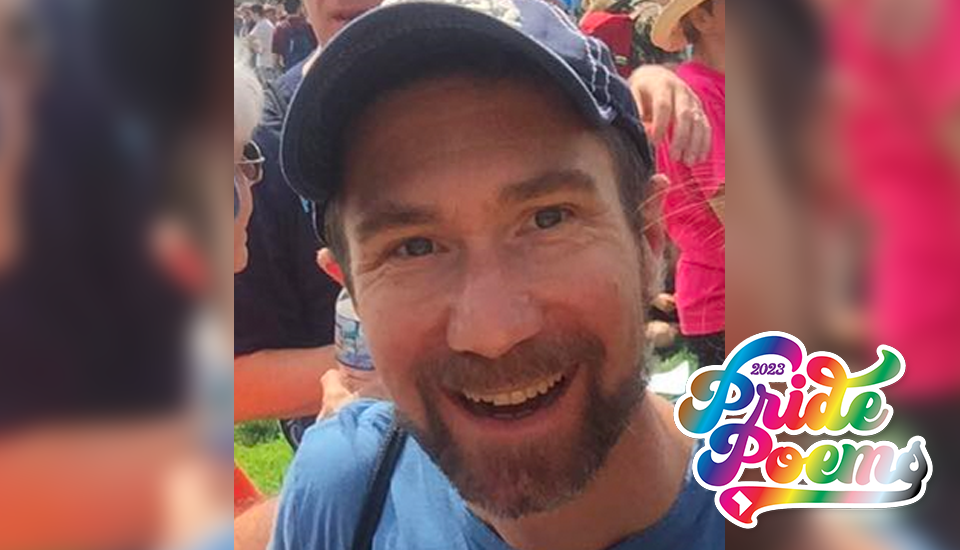
View Poem TextView Poet Biography
The Silence of Ice
We sit at the kitchen table for dinner
my father at the head, the rest of us
at our determined places, the 5 o’clock ritual
talking in silence the black-ice lake
offers a different silence, I skate alone
blades slice the ice surface, space and time embrace
a freedom as fast as the clouds and I can flyI stop where a leaf, shriveled and veined
lies frozen, silent and clear
once green and vivid with summer
like a secret freezes a life to iceI tell my parents, my father is silent
the three of us seated at the kitchen table
until the gasp, from long-trapped air
under frigid layers, and now appearing
purple with rage, fractures the familiar surface:
Don’t talk about gay in this house!Ice is black when it freezes
so fast in time and space
there are no air bubbles
to trap, to suspend
in silence – we sit at the table
frozen for two more decades.Ron Leo Vogel (he/him) writes poetry and essays. The son of immigrants who fled war in Europe, he grew up in New York’s Hudson River Valley. He was awarded the Prentice Prize in German from Wesleyan University where he translated short stories. His recent work has appeared in the literary journal Pensive.
“You Will Not Always Hear Cicada and Birdsong” by Kristen Zory King
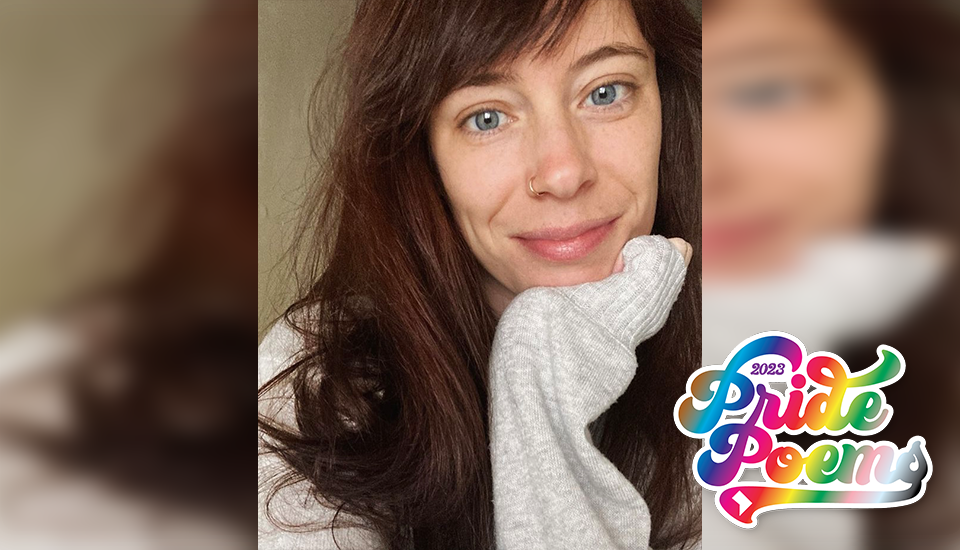
View Poem TextView Poet Biography
You Will Not Always Hear Cicada and Birdsong
They are impermanent,
like a paper cut or heartburn
or the dogwood with its blight.
So you etch your name
to a small pane of glass,
plant foxglove in the garden,
use a knife to carve love
into the tender flesh of birch
and say: I was here. Beg:
Remember. I, too, watched
light filter through the window,
hoped it would tell me something
I didn’t already know.Kristen Zory King is a writer, teaching artist, and yoga instructor based in Washington, DC. Find King online at KristenZoryKing.com.
Kristen Zory King is a resident of Mt. Pleasant.
“Blossoms” by Kathi Wolfe
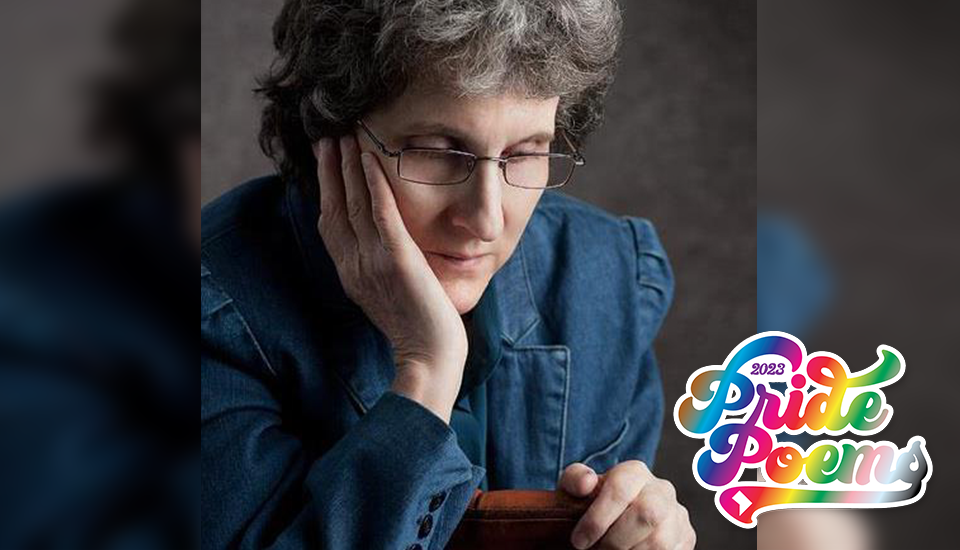
View Poem TextView Poet Biography
Blossoms
for my auntWhen I was seven, I didn’t want to grow up
to be an old maid like you. I knew onlya hubby, two children – a girl wearing red
Mary Janes and a boy with blue suspenders –and a dog like Lassie would do for me.
But I loved to lick the icing of the prettypink cupcakes you brought to our house.
“It was swell during the War,” you said,when I was 15, “I left the Pine Barrens
for Washington, D.C. I met Eleanor Rat a Hot Shoppe. I was so excited – my
hands shook when she lit my cigarette.Later, I fell in love with Rose by the cherry
blossoms.” I don’t know how things with youand Rose came to an end. You never
mentioned her again. Now, In D.C., alone, nokids or dog, years after my lover’s death,
I take a breath and carry on your life.Kathi Wolfe’s work has appeared in Poetry Magazine, The New York Times, Beltway Poetry Quarterly, and other publications. Wolfe’s most recent collection is Love and Kumquats (BrickHouse Books). She has been nominated for a Pushcart Prize. Wolfe was a 2008 Lambda Literary Emerging Writer Fellow. She is a contributor with the Washington Blade, the LGBTQ+ paper.
Previously appeared in WWPH Writes. Reprinted with permission of the editors.“Gandhi, or 5’5″” by Mariah Barber
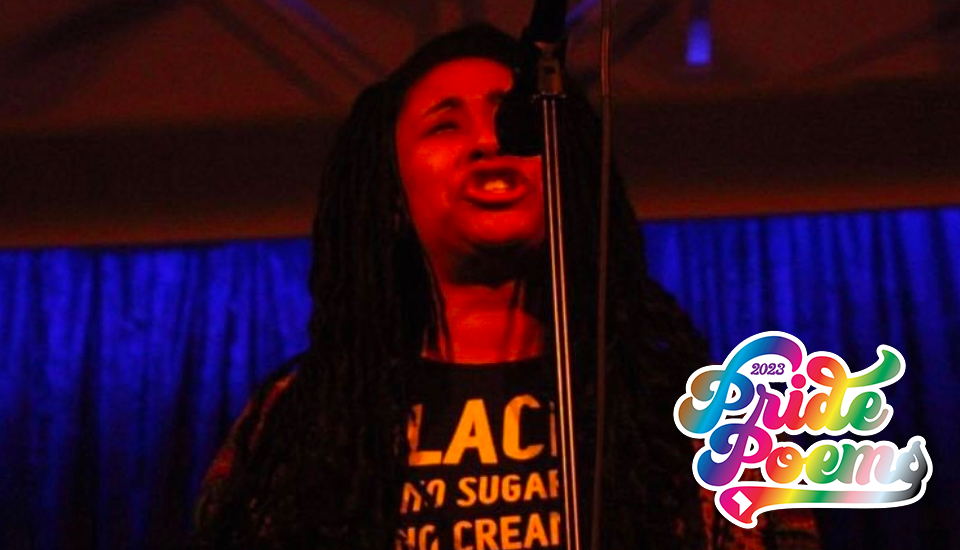
View Poem TextView Poet Biography
Gandhi, or 5’5″
From what the textbooks portray Mahatma Gandhi stood at about 5’5″
A rather frail looking man I’m sure could have only been 100 pounds, soaking wet
But the strength he carried in his heels was enough to weigh out the shackles of apartheid that had held India in imbalance for centuries
The peace that he exuded from his palms pressed together in prayer was enough to restrain the crooked views buried deep in generations of hate resetting DNA straight
My brother stands at a solid six foot one
More head than body I had no idea of the weight he bore in his bones
Only a junior at my old Alma Mater
His almond eyes have always possessed a sense of hidden wisdom
Knowledge well beyond his mere sixteen years
My mother called me at last week in the smallest voice I’ve ever heard escape her lips
Her words hit me like a sucker punch to the ribs,
Her voice pin pricking the air from my lungs
When she uttered the words: :
Riah what has gotten into your brother who he is trying to be Gandhi or something refusing to eat because I won’t sign his paperwork to join the new LGBT gay group at the high school what do you know about this?
It took me a moment to process the full of all she said but after sometime I reply with as much reverence as you can hold for a queen who’s just lost the last droplet of respect as she denounced her throne by clumsily dropping her last sentence
I’ll talk to him
I’ve always wondered if the dial tone that soon hit my mother’s eardrum more like a red flag or a cold shower calling for her to wake up from her complacency
To open her eyes and ears to the world around her to see the beauty in what she intended to be an insultBecause I’m proud to call my brother a freaking modern day Gandhi in a world full of bigots
I wish she could clear the hate from her sight cause like oil it’s left her blinded to what true love looks like
It cuts me deeper every time she calls to see if I’m still with her
Or why my brother still hangs out with his lesbian best friend because people may get the wrong idea
Or how her eyes slice my soul every time she stares at my rainbow pin
Or how I was afraid to share this poem because I didn’t want people to know what she thought of me
How little she thought of meIf my brother was Gandhi
I would be his bindi
His third eye helping him to see through the destruction of this world
I would warn him that they will try to bend and break him
But that’s why God built his bones like white columns on a temple
That’s why God put all that knowledge between your temples
I would show him how they would try to break him bend him into society’s often tight fitting molds
Try to turtleneck his soul
But his heart was never meant to be covered or closed
leave that to the doors and windows
So when they will try to straight jacket his personality
know in the mist of four white colored walls
you’re far from
crazy that just the world’s way of trying to put you in another box
but always meant to be more of a circle man
Full of unity and life
you’re in good company
all compasses and cloudscape lenses
Hell people even tried to make this earth flat out of fear
so you see past prejudice and for that the world will always seem threatened
you must be a muhadma of a man
taking their advice with a grain of salt
because you remember in another life you too had to protest that too
And when you didn’t join America they tried to beat you into compliance and Water you down with the Adderall they inject into you bloodstream
But know Gandhi was imprisoned too and they never had even the slightest handle on his spirit
So stand even when others are too foolish to sit
Pray even when they say your cause is already forsaken
Call out even when the abyss is so dark you assume you fell on deaf ears
Cause today more than ever this world needs a person as spherical as you to lead it
Name it
And call it
And if you must sign truth when ignorant hands are either too shaky or in clenched fists
Cause sometimes forgery is necessary when no authentic love surrounds you
And I love you
Even when the world forsakes you
I realized I never hung up on my mother just clicked over to the other line
Hell When Gandhi calls you don’t keep him waitingMariah Barber is an author, certified health education specialist, DEI consultant , and researcher who has been working in public health for over a decade. Barber holds an MPH in community, social and behavioral health as well as a B. S. in public health with a concentration in community health and a B.A. in international studies with a concentration in Latin America. She has a dual certification in cultural competency and global understating as well as an immediate language proficiency in Spanish. Historically, Barber‘s work has been focused on the intersectionality between biological and social sciences on a global scale. Additionally, her professional experience includes working as a radio personality, spoken word artist, content curator, mentor, moderator, researcher, counselor, facilitator, writer, researcher advocate, organizer, teacher, podcaster, blogger, public speaker and educator which all influence the passion that she brings to public health initiatives. Her mission and mantra in life is: “Some People Do, Some People Never Do, Some People Overdo, How Do you Do?” Barber does things to uplift unheard voices.
Mariah Barber is a resident of Noma.
Originally appeared in “Of Mics and Pens and Gods and Other College Courses“ in the documentary “An Education.“ Reprinted with permission of the author.“Memorandum to the Young Homosexual” by Yermiyahu Ahron Taub
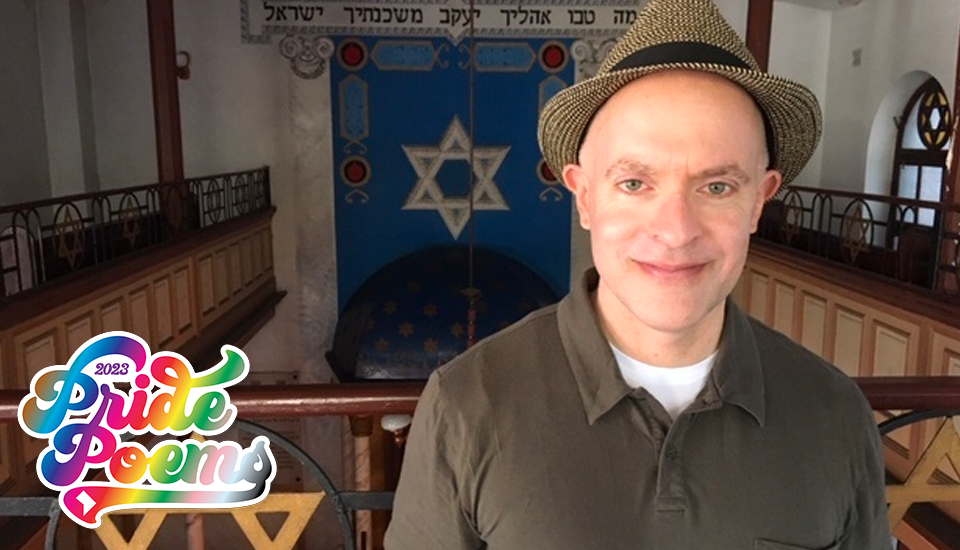
View Poem TextView Poet Biography
Memorandum to the Young Homosexual
I’ve seen you looking, boy.
No, of course not at an old queen like me, my southerly titties
sheathed in silk and sequins and Turkish cigarette smoke.
Still, I do have my admirers, even if you won’t find them
in the bars or the bathhouses or the brambles. We gather in my apartment
well east of Tompkins Square Park. Jimmy, Stephen, Reginald always
come. Henry and Lars, too. Good men all, though not without their
foibles. Stephen, for example, has always been paranoid. Still
fearful of arrest. Yes, even in my apartment. Even to this day. I know
it’s a bit out of the way, but the invitation is always open. Although the
refreshment is light—wine, cheese, crackers— and the attire is casual, it is
still a royal court of sorts. All right, a salon then, if you insist.
Or perhaps an oral history archive or a museum of relics?I’ve seen you looking, boy.
It takes one to know one, and I know that of which I speak.
In my day, you see, interfacing wasn’t virtual.
Encounter required touch. And to make that happen, the body and its
language had to be read, a literacy which required years for mastery.
There was nothing instinctive or “gut” about it.
The stakes were high, mind you. You could end up in handcuffs—
and I don’t mean the velvet ones—in a cell with pimps and killers
and with your name on a list in the papers and out of a job.
You could end up pummeled or slashed or slain and dumped
into the river or beneath an overpass, the traffic whirring overhead—
the stuff of pulp novels minus the campy covers or noir
without the hard-nosed dick to rescue you. Of course, you still could.I’ve seen you looking, boy.
I know of the gaze drawn to strapping workmen.
Sometimes I saw them on the way to my office job,
shirtless at a building site, whistling at women going by,
eating a sandwich in wax paper and swilling I-never-knew-what
from a blue metal thermos. I still recall that shade of blue.
Sometimes in the diner Helena, my girlfriend from the office,
and I favored for lunch. Their pastrami sandwiches were legendary.
No, Helena was not my beard. She was a friend, a worksite-specific one,
to be sure. Sometimes I would see men by the piers at night or early
morning, when the ache got the better of me and repartee and bourbon
were no longer enough. My reading skills were most essential
in the darkest dark, without aid of moon or flash- or streetlight.I’ve seen you looking, boy.
And I am not impressed; you have much to learn.
You need to master the art of the surreptitious glance.
The eye should lightly graze; avoid the full-fronted stare,
but don’t assume a position of coyness, either.
You aren’t a demure maiden or a geisha.
Don’t conceal your smile by your hand or shadow.
Your shoulders should not slouch,
but they needn’t be militarily set back, either.
You will have to do all this in a matter of seconds. Little thing like you,
your life may depend on it. And no, that’s not hyperbole.
Is there a Helena in your life? Come to our next gathering, sweet pea.
I’m sure Lars can rustle up just the right young lady for you.Yermiyahu Ahron Taub is a poet, writer, and Yiddish literary translator. He is the author of two books of fiction, Beloved Comrades: a Novel in Stories (2020) and Prodigal Children in the House of G-d: Stories (2018), and six volumes of poetry, including A Mouse Among Tottering Skyscrapers: Selected Yiddish Poems (2017). Taub’s most recent translation from the Yiddish is Dineh: an Autobiographical Novel by Ida Maze (2022).
Yermiyahu Ahron Taub is a resident of Brookland.
Previously appeared in The Education of a Daffodil/Di bildung fun a geln nartsis (Hadassa Word Press, 2017). Reprinted with permission of the author.“Love of Hate of Love” by Chris Biles
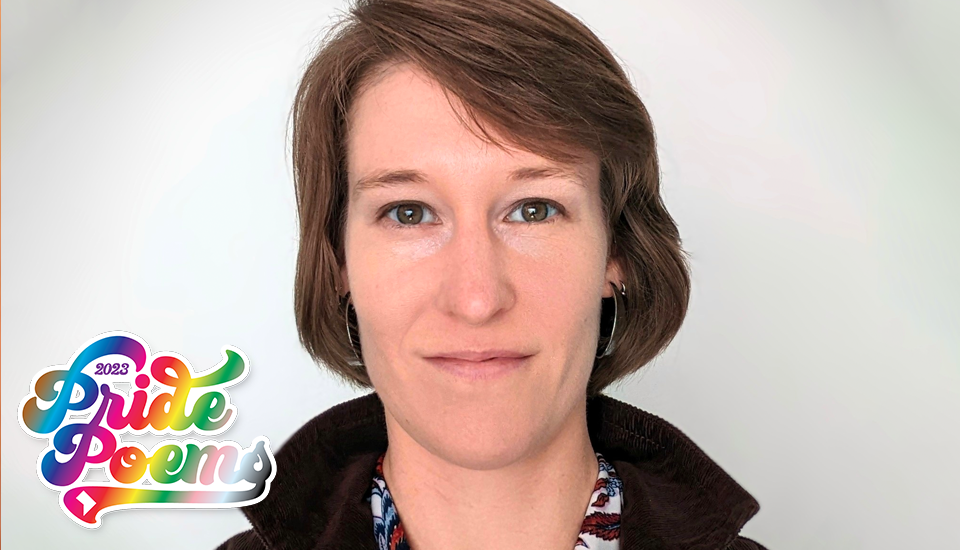
View Poem TextView Poet Biography
Love of Hate of Love
I practice punching
at the kitchen table
on the couch
in my sleep
I make a fist
study the veins that press out
against the skin of my forearmsI see my life there
heritage of hate
the blood runs thick:
my rage, my joy
the tender twisting of the two
competing
contradicting
– my love of hate
rising in my pulse
with the power of perceived necessity.I make a fist
and see my life thereThen I pause
release
breathe
lay down my hand
let it rest on the kitchen table
beside the gentle whorls of woodgrainI study the stillness
and the weight of reality hits
as I wonder
if my narrow fingers
veins
running the length of my forearm
would still look this way
if I took it too far
would still look this way
in the stony stillness of deathI practice punching
at the kitchen table
hating your hate
but now I ponder your reaction
if I hugged rather than hitI hate your hate of love
but
now I realize
your hate of love
makes my life powerful –now I realize
just being
I hit
like a heavy
hammerChris Biles currently lives and works in Washington D.C. where she enjoys playing with the light and the dark, and losing herself in music, anything outside, and some words here and there. Biles was a finalist in the 2022 and 2023 DC Poet Project, was honored by the Monologues and Poetry International Film Festival with an official selection in 2021, and is published in a number of literary magazines, journals, and anthologies in print and online.
Chris Biles is a resident of Foggy Bottom.
Previously published in Another New Calligraphy, April 2022. Reprinted with permission of the author.“Poems Knocking at My Heart” by Saundra Rose Maley
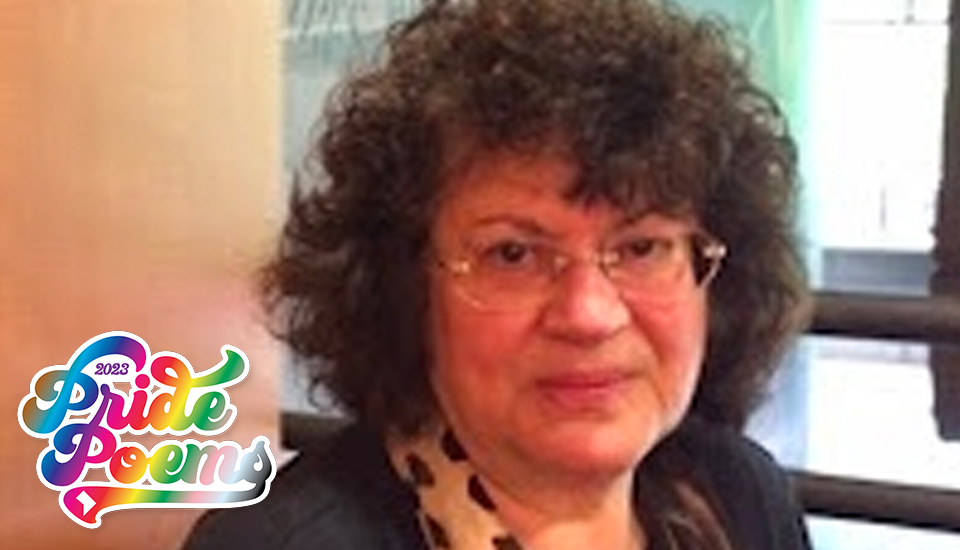
View Poem TextView Poet Biography
Poems Knocking at My Heart
I
A young woman dreams
under a cinnamon tree
waiting as the tree bloomsthree times
II
how long will I love her?
how long will I walk this earth?III
my robe fell a thousand times
into the shadows of our straw matIV
I cannot sleep
the rose quartz bowl
where she washed her handsher face
stands too near the bed
V
I take my brush
and write sad poems
in the snowstartled plums fall
Saundra Rose Maley is the author of the poetry collection Disappearing Act (Dryad Press, 2015). Her poems have appeared in Beltway Poetry Quarterly, Dryad, Gargoyle, and Innisfree, among other journals, and in the anthology Full Moon on K Street: Poems about Washington, D.C. She co-edited A Wild Perfection: The Selected Letters of James Wright with Anne Wright (Farrar, Straus & Giroux, 2005) and the two have just completed So Much Secret Labor: James Wright and Translation with Jeffrey Katz.
“To my mother at the start of the pandemic” by Gowri Koneswaran
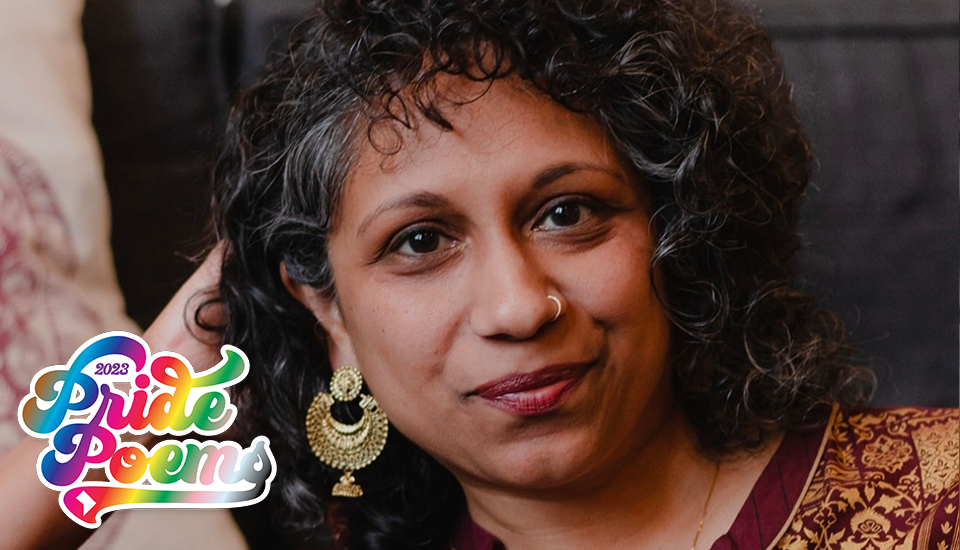
View Poem TextView Poet Biography
To my mother at the start of the pandemic
Dear Amma,
How do we mourn
what surrounds us?How we do the doing,
keep the walls from falling,
pantries stocked,
silent soundscapes.Yesterday we talked about
motivation and none
and time and
endlessness.Of nourishment and cooking
and feeling too tired to try.Of my childhood and your mother
making my favorite curries and
stitching her sari blouses
all the years she lived with us.
And how I never knew it was you
who sewed my dresses.I informed you that I’d loved
the plastic headbands you’d purchase,
and broke them, one at a time, on purpose.Hiding on the staircase, boiling with
the anger children can summon, directing it
at the hardest objects in my possession.
I knew they would break, not bend.We spoke of your Hindu wedding and
how your parents’ church objected.
You reminded me that no religion
could cleave us.Then you asked me to give
your love to my partner.
Just one year after you met her
and learned of my truth.I have nothing else to ask of you.
Only, can we keep growing together?Gowri Koneswaran is a queer Eelam Tamil writer, performing artist, teacher, and lawyer. Her work has appeared in the Journal of Asian American Studies, Environmental Health Perspectives, Lantern Review, and The Margins. Her advocacy has addressed animal welfare, environmental protection, the rights of prisoners and the criminally accused in the U.S., and justice and accountability in Sri Lanka. She is the Literary Arts Programs Director at Split This Rock, a copy editor for The Abolitionist Newspaper, a Kundiman fellow, and a senior legal officer with PEARL.
“Born Backwards” by Tanya Olson
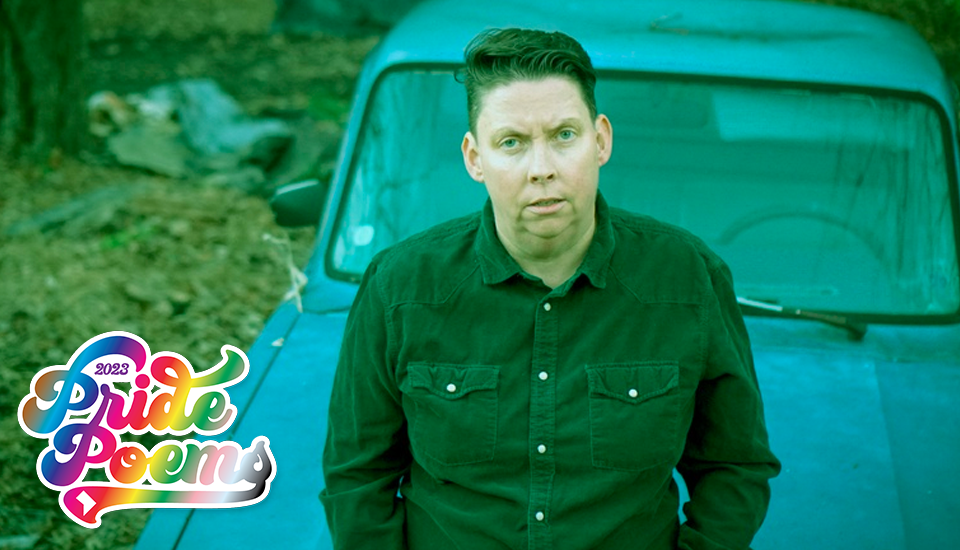
View Poem TextView Poet Biography
Born Backwards
Feet first Ready to run
Problem for the doctor
Danger to my mother
Forceps locked around
my skull Three firm tugs
leave a permanent dent
Such the queer
way to beginAn early reader My first job
to toddle down the driveway
Fetch the paper Read the headline
aloud White House Defends
Air Raids Farm Prices Recover
Never learned to read Just read
A skill already inside me
Games on the way to see Grandma
Spell what we saw P-I-G pig
C-O-W cow D-O-N-K-E-Y
donkey What we heard on the radio
That’s Elvis E-L-V-I-S They say
he’s back but he never really
went awayI stay with Grandma for a week
at the beginning and end
of each summer Jobs at home
don’t have a name but
Grandma calls them chores
Feed sheep Weed beds Pick beans
You get the low ones I’ll get the high
ones Together we’re a perfect pair
Those summer weeks are the purest
love I will ever know Fertile seeds
in hungry soilAt lunch the radio plays
funeral music Deep voice
Service place and time Grandma
tells me something about every
name we hear Kin Job Where
she saw them last We nap
and wake to watch General Hospital
which I always think is The Doctors
because of the way it starts When
the party line rings not our ring
Grandma turns down the sound
Raises her eyebrows Puts a finger
to her lips Picks up and listens
long enough to know what she
needs to knowBefore bed I read to her
from a chapter book She buys
them from yard sales Saves them
when the library throws them out
This one describes how a dairy
is run When I correctly pronounce
pasteurize Grandma shakes her head
in awe How would a little girl
even know that word I swear
sometimes you must have lived beforeWhile I am away the yellow
apple tree at home gets split in two
by lightning My father builds a stand
in its still living half For you For reading
he explains when I return High enough
to see over the corn Having never
seen an ocean I imagine I am a sailor
spending weeks at sea From my nest
I work through the sack of Great Kid Classics
Grandma gave me when I left
Up there I eat the apples that continue
to grow at hand In each lies
a tang of fireOne songy poem roots in me
that summer A caught fish
turns into a woman and promptly
runs away That summer I live
off the ground surrounded by
the rustle of tall as me corn Below
a constant thrum of wasps
drunk on the windfall apples
Every morning I battle Roo
the meanest rooster who ever
lived His flash of spurs
when I gather eggs hurts
my feelings All Roo knows
is to protect his flock
my mother counsels And to him
you are just the giant girl who stealsChores for Grandma are gentler
Feed the bottle lambs Give them
their names But lambs are scary too
Such hunger when they spot me
carrying the milk bucket The power
and need in their unrelenting suck
Before she opens the pasture gate
Grandma rubberbands breadbags
over my shoes While she makes
supper Grandma ties a string
to each end of the flyswatter
so I can wear it over my shoulder
and play it like a guitar She claps
every time I spin around and announce
Hello My name is Johnny Cash
When my parents come to take me back
I introduce them to the lambs
Share the names I have chosen
Peanuts Popcorn CrackerJack
My mother feeds them apple slices
while they gently lip her handMy friend Clark insists the only
people who want big gardens
as adults never worked in one
as kids He’s not entirely wrong
about this Every day is something
Hoe Dig Plant Weed Water Pick
My least favorite job is plucking
hornworms off the tomatoes
I drown each one in the coffee can
of kerosene we use to light
the trash barrel A song for each
as they go Return to sender
Address unknown Lay down
in the corn to hide and read
Frankenstein the final book
in my summer series The monster
learns to fit in by watching
The monster runs so as not
to hurt what he loves The monster
promises I will be with you
on your wedding night The monster
doesn’t see himself as a monster
but the world does not agreeMy contentment that summer
will not last Soon I begin to dream
of leaving Believe to really be
I must go somewhere else
Clothes Jobs Books Music
the ways I build this distance
I still love Elvis Still read
voraciously Grow only
tomatoes Name animals
thematically This year
my dentist correctly
identified me as a wellwater kid
No fluoride in those early years
make the teeth you have todaySome book taught me I was different
than my parents Some book told me
queer kids run I always misremember
how that fish poem ends The woman
gets away but the man vows
to find her and keep her
until time and times are done
He believes together they will
pick silver apples of the moon
He thinks she will sit forever
by his side Happy to watch him
pluck the golden apples from the sunTanya Olson lives in Silver Spring, Maryland and is a Lecturer in English at UMBC. Her first book, Boyishly, was published by YesYes Books in 2013 and received a 2014 American Book Award. Her second book, Stay, was released By YesYes Books in 2019. In 2010, she won a Discovery/Boston Review prize and she was named a 2011 Lambda Fellow by the Lambda Literary Foundation. Her poem “54 Prince” was chosen for inclusion in Best American Poems 2015.
“Color of Choice” by Alex Carrigan
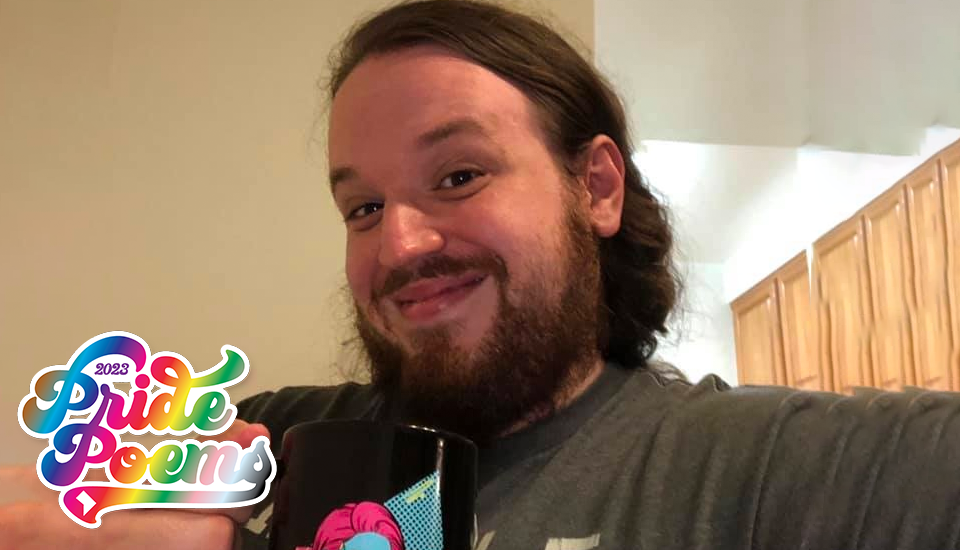
View Poem TextView Poet Biography
Color of Choice
For Henrietta LacksRed was always around you
and will always be what’s left of you.
The chips of nail polish that could be
found under your bedroom vanity.
The blood the doctors at Johns Hopkins
drew from you for yet another test.
The imprints left from digging your nails
into your palms as the news is delivered.Red was around you the night you revealed
your secret to the women in your life.
You waited until you and your companions
were at the top of the Ferris wheel
before you told them you have cancer.
Their faces turned red from the glow
of the light bulbs along the rail.
Or maybe it was the grief that was
finally painted over them as they wished
the world could move again.Red will always be around you,
from the faces of your five crying babies
to the dress you wear in your gallery portrait.
You love red so much that you made sure
it will always be around, for that color
is the one bit of immortality drawn from you,
separated into slides and test tubes,
injected and radiated, shot into space,
your life an ever-multiplying cluster
of red circles pressed under glass,
defying entropy and proving you
will always be around.After Jesi Bender
Alex Carrigan (he/him) is a Pushcart-nominated editor, poet, and critic from Virginia. He is the author of May All Our Pain Be Champagne: A Collection of Real Housewives Twitter Poetry (Alien Buddha Press, 2022), and Now Let’s Get Brunch: A Collection of RuPaul’s Drag Race Twitter Poetry (Querencia Press, 2023). He has had fiction, poetry, and literary reviews published in Quail Bell Magazine, Lambda Literary Review, Barrelhouse, Sage Cigarettes (Best of the Net Nominee, 2023), Stories About Penises (Guts Publishing, 2019), and more.
“The Holy Temple of Drag” by Rasha Abdulhadi
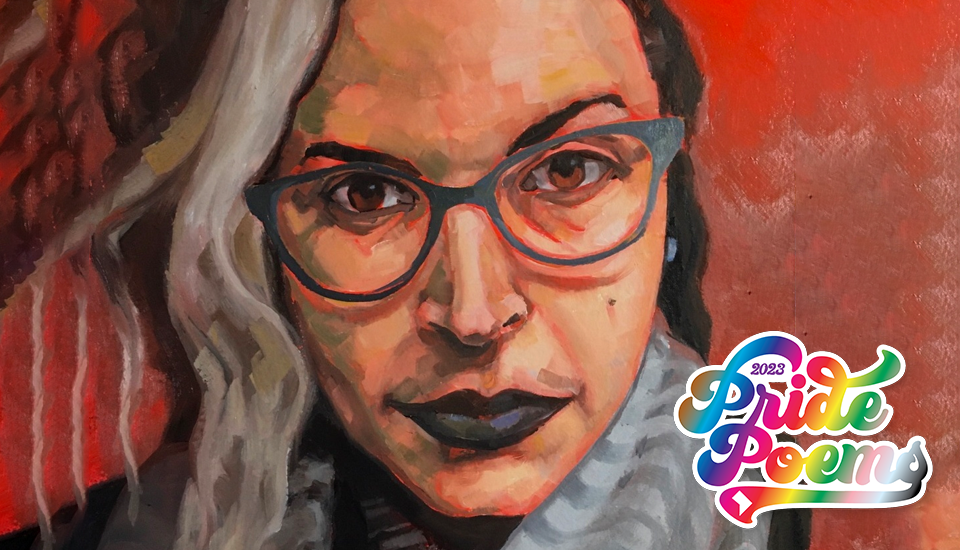
View Poem TextView Poet Biography
The Holy Temple of Drag
for Pulse and all my endangered kinI sweat out my fever that night
in the holy temple of drag,
watching my baby sister in a mustache and codpiece
invite us all to take a walk on the wild side,
wholly supplicant to the divine glamdrogyny
that could be called down to dance through you
if you could wrestle free enough
if you could accept into your heart the saving power
of glitter. and rock-n-roll. and rhythm-n-blues.
and stank nasty love songs sung along from every stall
in the gender neutral milk hotel
every friday, saturday, and sunday night
offering a new watermark on your excitement
Until this sunday,when my fever was breaking,
and you were dying, you and your partner, you and your
mother, you and the bartender and bouncer and the 18 year old
girl dancing her heart out and I can’t understand
how you weren’t me or my sister
with our shaved-head glitter-eye swaggeror our friends, our drag sistren and brethren
in a neighboring state where we partied
in defiance of laws that tried to deputize and sanctify hateand I wondered
if the fbi had baited a hook whose sharp sting
went sideways– or worse, if that barb
landed right where aim sent it
none of us, blackbrownredyellowqueer
tongues embroidered by other languages,
have expected safety for a long time, if we ever could or did
I do not mistake police or politicians for my friends
no matter what the press statement says
My best allies have always been resistance. Rebellion
really brings out my eyes. I find courage
is a look anyone can pull off and sanctuary
exists only in the interstices we hold open for each other.and I wondered too
if this was personal, a story about the hidden body
of the gay Muslim—as occluded as the twelfth imam
who one day prophesy says may return
perhaps then gentle in form as a rainstorm
whose lips fear no kiss.and it seems that nothing
will feel like justice until we heal
and that I must give myself
to my nieces and nephews
like a bridge.My southern, my muslim,
my arab, my baptist, my palestinian, my buddhist, my queer butch eyeliner
families, hear me: my self feels like the battlefield over which the daily news is
fought, the truth spiraled downfield to mark gains
for one military or another
while I’m trying to hold the world inside my skin
and calling all my kin to hear how they’re hanging on.and you—
you texted your mother that night
to tell her you loved her.may I, on the night I die, with the best of my courage,
have the last words on my lips be
I love you. I love you world that broke me, I love you slaying
hand, I love you betraying friend, I love you
family that would not see me, I do not fear you for I knew
my silence would not save me, make me invisible or hide me
from surveillance that can find, detain, deport, or execute me
just as surely as the hand of any man trying to terrorize my temple,
and so I will not surrender these sacred spaces
or let them become mute monuments. I am not here to hug any racist,
and even if we will never be safe:
it is you I am am pledged to, always.Rasha Abdulhadi is a queer Palestinian Southerner disabled by Long Covid. Rasha’s writing has appeared in Kweli, Poem-a-Day, Electric Lit, carte blanche, Anathema, Shade Journal, FIYAH, Mizna, ROOM, Strange Horizons, Beltway Poetry, and Lambda Literary. Their work is anthologized in Essential Voices: A COVID-19 Anthology, Snaring New Suns, Unfettered Hexes, Halal if You Hear Me, and Luminescent Threads: Connections to Octavia Butler. A poet, and speculative fiction writer and editor, Abdulhadi is a member of Muslims for Just Futures, the Radius of Arab American Writers, and Alternate ROOTS. Their new chapbook is who is owed springtime.
Rasha Abdulhadi is a resident of Washington, DC.
Previously appeared in Split This Rock's Virtual Open mic. Reprinted with the author's permission.“Lucky or Lovely” by Natalie E. Illum
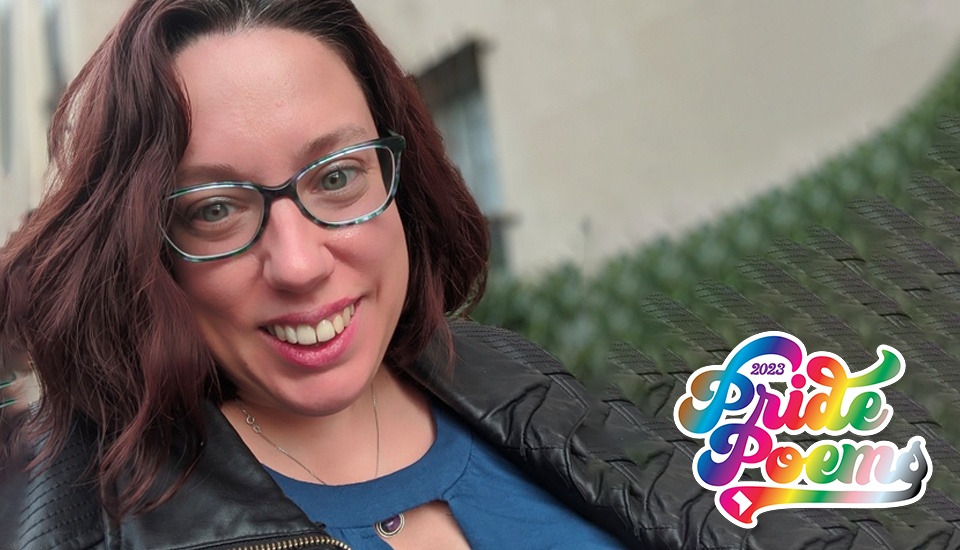
View Poem TextView Poet Biography
Lucky or Lovely
after Alice Sebold
I wanted to tell you, Mama,
It wasn’t a sharp plunging
into blackness. It wasn’t a hard fall.
Not like the time I broke my kneecap
roller-skating in kitchen, or the night
I was kissed into oblivion.All I know is there were dark smudges –
treetops too far below, that the buildings appeared
like Northern Lights. I tried to rememberthe equation for speed, to calculate my death
like a 9th grade math problem. But there was
only time to think of your devastation,
your devotion. How I would move beyond
your forever loss. I wanted to absolve the impact –
whisper my small happinesses. But my memory wavered
like this plane; I was combustible.I love you, Mama. A bone-shattering love.
Please know I wasn’t a broken bird. I was freed
from the velocity of flying. I rose
as my body collapsed, I soared
above the wreckage.Natalie E. Illum is a poet, disability activist and singer living in Washington, D.C. She is the recipient of five Poetry Fellowship grants from the DC. Commission on the Arts and Humanities, a Jenny McKean Moore Fellowship, and is a Pushcart Prize and Best of the Net Nominee. Illum is also a singer-songwriter of the band All Her Muses, whose album, Not speaking in metaphor, was a 2023 Wammie nominee for Best Pop Album. She holds an MFA from American University, and was a founding member of the mothertongue collective, an monthly LGBTQA open mic and workshop series that ran for 13 years.
Natalie E. Illum is a resident of Shaw.
“Dear David” by K. Tyler Christensen
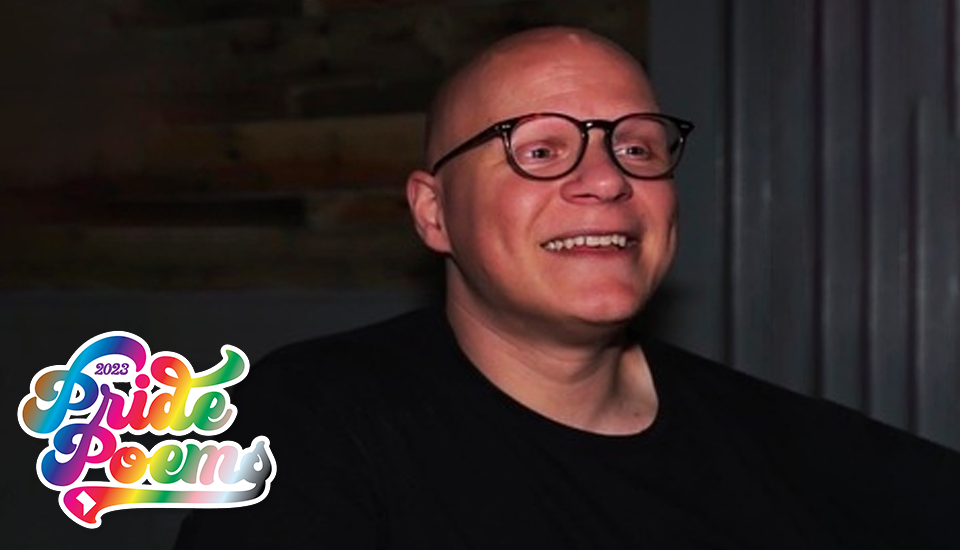
View Poem TextView Poet Biography
Dear David
for David Wojnarowicz
(b. September 14, 1954 – d. July 22, 1992)You died on my eleventh birthday
while I blew out my candles you drew
your last breath death by government neglect
artist/activist/writer/thinker/hustler
AIDS took you and your friends from the world
of art and politics and I am your inheritor
your queer progeny a descendant spreading
your words as if they are your ashes
spread on the White House lawn I spread
your words to the bent ears of this generation
of lovers to anyone who wakes up
in this killing machine called america
and who knows what it is like to have a target
at their back to be marked as expendable
to be subject to the eradicating impulses
of the united states government who spread
the lie of the ONE-TRIBE NATION
and falsely promise freedom then indict us
for who we love abandon us when we show up
sick in the world they have created
for a select few I spread your words
not as if they are your ashes
but because they are your ashes—
they are what is left of you.K. Tyler Christensen (any pronouns) is a writer living in Washington, DC. They are a professorial lecturer in the departments of Literature, and Critical Race, Gender, and Culture Studies (CRGC) at American University. Their chapbook, That Boy from Idaho, was published by Ghost City Press in 2020.
K. Tyler Christensen is a resident of Brookland.
“How I Became a Writer” by Tanya Paperny
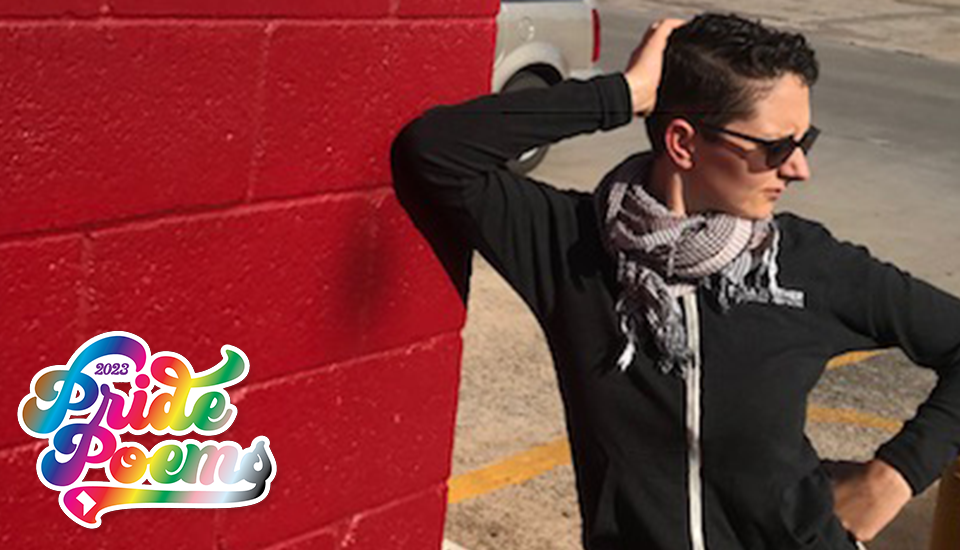
View Poem TextView Poet Biography
How I Became a Writer
cut paper, hand-bound black cardboard
ruler, X-Acto knife, self-healing mat
Stone Soup submission mandates, “My First Book”a facility with language
Santa Monica Public Library on 7th Street
bilingual “family home”three siblings born in a country that no longer exists
handmade Papier-mâché puppets
who refused to speak Englishlog of a 1994 Moscow trip —
“it was very, very dirty there”
“I saw the place where they cut off people’s heads”Anne Carson’s Autobiography of Red
an attempt to circumvent silence
escape the “family home”looking out the window of a Greyhound bus
looking out the window of an Amtrak train
neglected industry along the Northeast Corridorмастер и маргарита, горе от ума, жалобная книга
third-culture kid but not quite
longing, diaspora, fracturing — the seductive lure of traumaTanya Paperny is a writer, editor, translator, curator and community builder in Washington, DC. The child of Soviet Jewish refugees, her works deals with the aftermath of atrocity. Tanya’s essays, poetry and reporting have appeared in LitHub, The Atlantic, The Washington Post, Washington City Paper, The Literary Review, Beltway Poetry Quarterly and elsewhere.
Tanya Paperny is a resident of Edgewood.
“To Live In That Country” by Dan Vera
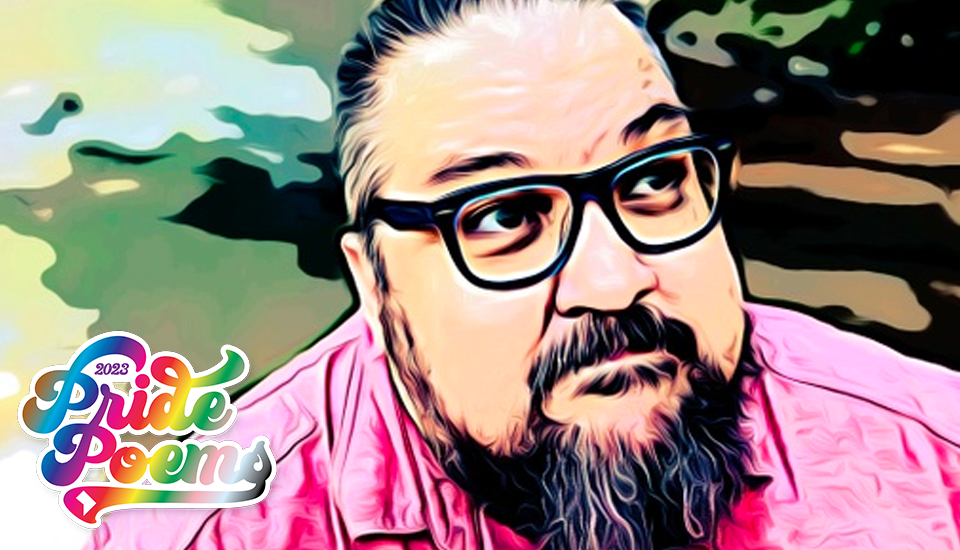
View Poem TextView Poet Biography
To Live In That Country
glimpsed, imagined, and longed for,
to live within those borders
that once seemed impregnable,
whose language baffled yet enticed,
whose customs lay beyond all understanding,
its shared traditions and inside jokes,
its annual celebrations, its
quiet memorials to overcomings,
to hard fought victories,
to beloveds lost and remembered,
to have the joy of one day becoming
a proud and cherished citizen
of this country, long fought for
and now resplendent,
to live in the country of our queer loving.Dan Vera is a DC-based writer and editor. An award-winning author of two poetry collections, he co-edited Imaniman: Poets Writing In The Anzaldúan Borderlands (Aunt Lute, 2016). His poetry appears in various journals, anthologies, and academic curricula. A featured reader around the country including the Poetry Foundation, Poets House and Dodge Poetry Festival, Vera co-curates the literary history site DC Writers’ Homes and chaired the Split This Rock board.
Dan Vera is a resident of Brookland/Michigan Park.
“Kourban” by Holly Mason Badra

View Poem TextView Poet Biography
Kourban
The adults would say it to the kids, Kourban.
Like the sound a sheep makes, it goes “Core-baan.”Kourban-e-bim, Kurdish translated into English means:
I am willing to sacrifice myself for you. I sacrifice myself to you.A table of 12 chairs filled with aunts and uncles playing cards—
A young girl, I come up to my mother and whisper something into her ear,I hear her tell them the secret as I walk away;
I hear them say, Kourban.Not knowing then just what it meant, but knowing it made me feel
Both pleased and embarrassed— Kourban.And now, when my own nephew is soft in my arms,
Opening his little hand to the early moon, saying “hold you, hold you,”I look at him and the thing in my chest is Kourban.
Escaping my lips, Kourban.Holly Mason Badra received her MFA in Poetry from George Mason University where she is currently the Associate Director of the Women and Gender Studies program. Her work appears in The Rumpus, The Adroit Journal, Rabbit Catastrophe Review, The Northern Virginia Review, Foothill Poetry Journal, CALYX, and elsewhere. She has been a panelist for OutWrite DC, RAWIFest, and DC’s Al-Mutanabbi Street Starts Here events as a Kurdish-American poet. Mason Badra is also a reader for Poetry Daily.
Previously appeared in The Northern Virginia Review. Reprinted with permission.“The Vista from the Mediterranean Sea” by Robert L. Giron
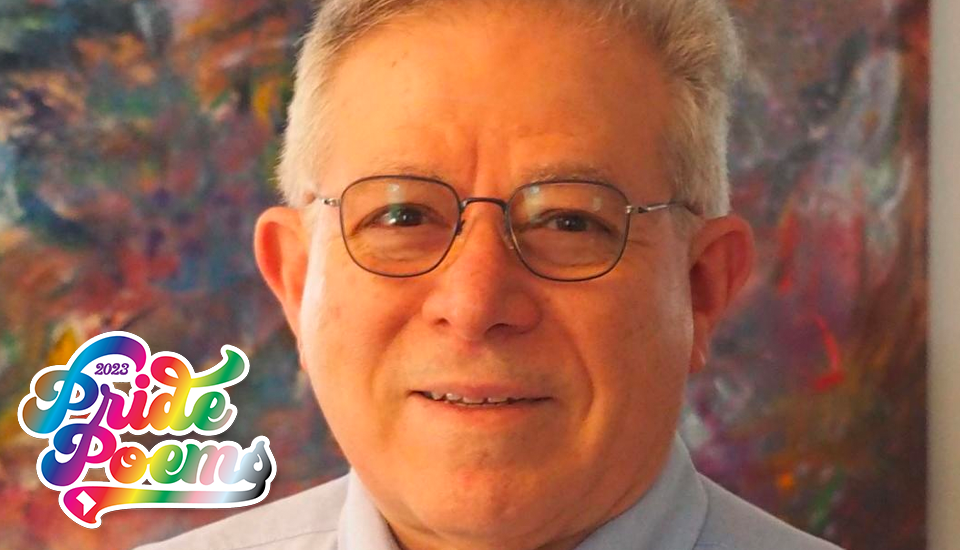
View Poem TextView Poet Biography
The Vista from the Mediterranean Sea
Picture a tree, one with deep roots,
going deep into the ground,
spreading out amongst the land,
with branches twisting like
the sinew of flesh
Not unlike the olive tree,
bark rich in hew and texture,
bearing fruit, as then, now and
into the future—
There amongst the rock, cacti,
wildflowers cover the terrain
lush with life out towards the sea
as bees swarm about drawing in
nectar from blossom to blossom
Then the rich lather of honey
bathes the hive and we
the bearers of knowledge gather
treasures to last a life timeRobert L. Giron is the author of five collections of poetry and editor of four anthologies. His poetry and fiction have appeared in national and international anthologies among other publications. He discovered recently that his ancestry covers most of Europe and the greater Mediterranean area, including Indigenous roots from Mexico/Texas—just a man of the world. He currently is an associate editor for Potomac Review and is the editor-in-chief of ArLiJo and is the founder/publisher of Gival Press.
“A Testament of Love in the Yogurt Aisle of the Mansfield ShopRite” by Caly McCarthy
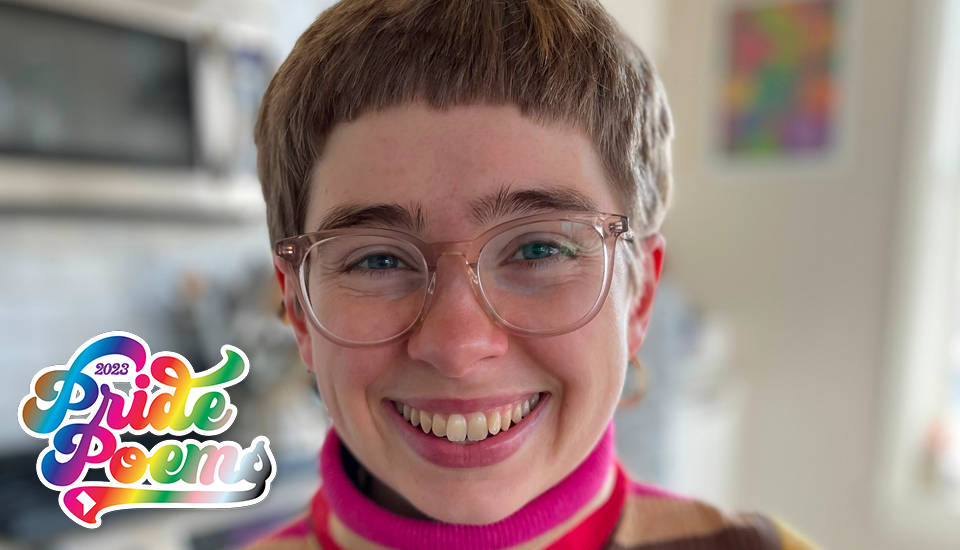
View Poem TextView Poet Biography
A Testament of Love in the Yogurt Aisle of the Mansfield ShopRite
Every day
for the last twenty-seven years
my father has worn
a self-appointed uniform
of khaki pants,
a collared, button-down,
blue and white pinstripe shirt
with a Land’s End,
navy blue,
V-necked sweater.
He readily admits
that he cannot multitask.
And, yet,
he buys me yogurt.In the supermarket parking lot
he deposits twenty-five cents
to release the contraption
that locks one cart
to the next,
jangling the chain
and freeing the big basket on wheels.
Probably
he doesn’t need it.
It’s overkill
for thirty-two ounces
of semi-solid milk,
but he is a man who appreciates ritual.Following the perimeter of the store,
the refrigerated path
to the promised land of culturally sound bacteria,
he arrives in Aisle Twenty-One
and consults his list.
It says:
Stonyfield Greek,
non-fat,
vanilla yogurt.
He consults the wall.
It says:
organic, fruit-on-the-bottom, with almonds, sans fat, gluten-free, bound to make you joyful and prosperous, please consider reading The Paradox of Choice.The refrigerator case
is a matrix of variables,
a prime application
of conditional probability statements.
My father has never
excelled in math.
Nevertheless, he skims the non-fat selections.
He cannot find one
to my specifications.He pulls out his phone and dials.
I am in his “Favorites” list,
but he is of a generation
that commits to memory the phone numbers
of the people they love.I am in class,
and my phone is on vibrate.
He leaves a message,
asks me to call him back,
he wants to make sure
that he’s looking for the right thing.To pass the time until my class ends,
he walks around the store,
takes his blood pressure
at the machine near the pharmacy counter;
it’s 110 over 78.
He writes it down,
will tell us all at dinner
how impressive it is,
especially for a man of his age.He checks his phone.
I haven’t called back,
but he needs to return to work.
He hedges his bets and walks to the Courtesy Desk,
explains that there’s no
Stonyfield Greek,
non-fat,
vanilla yogurt
in Aisle Twenty-One.
On their loudspeaker
they interrupt Maroon Five
to ask Someone in Dairy,
to Call 2-4-5, Someone in Dairy,
to Call 2-4-5.Dairy calls 2-4-5.
There is a case of my yogurt in the back.
They ask how much he wants.
One container
will last me a week.
Maybe he knows this.
Maybe he doesn’t.
As long as I’ve known him,
my dad has steadfastly believed
in buying in bulk.
He asks for three.Caly McCarthy (she/her) is an ace writer who loves finding new ways to cook beans and usurp capitalism. She serves as the Marketing and Communications Coordinator for Fairtrade America and also as a reader for Poet Lore. Her work has been published in Christian Century and enfleshed.
Caly McCarthy is a resident of Cleveland Park.
“sepulcher” by Ishanee Chanda
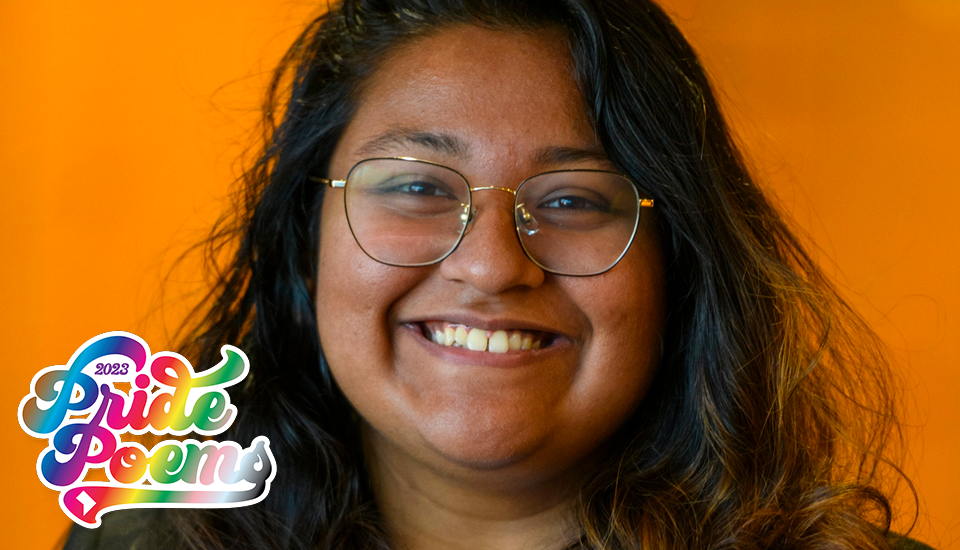
View Poem TextView Poet Biography
Sepulcher
there is a thistle of sage growing on my grandmother’s grave. it is sprouting in lumps. grief clings to its leaves. she lies underneath the earth, shattered finger bones still reaching for the five o’ clock shadow on my father’s face. he hangs a painting of her in his bedroom. she sits stiff in a chair full of dead wood, her face shining with something sickly. he sleeps in a garden of her grave. wakes up with dirt in his ears, flower buds peeking out from underneath his eyes. he says she sings to him when he sleeps. when he leaves us to follow her, we are left pulling bouquets of wildflowers out of our sheets.
Ishanee Chanda is a prose writer and poet from Dallas, Texas. She is the author or two books of poetry titled Oh, these walls, they crumble and The Overflow. Chanda enjoys eating her weight in Thai food, singing loudly to Taylor Swift, and rolling out a fresh batch of pasta dough every night.
Ishanee Chanda is a resident of Brookland.